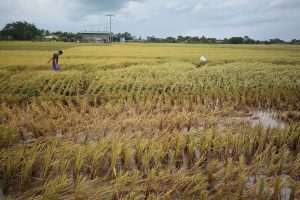THE AGRICULTURE department’s 2023 budget will point to the steps the Marcos government intends to take to achieve food security, farming industry officials said, adding that they are also waiting to see how the new leadership will deploy the remaining funds still available in 2022 from the budget prepared under the previous administration.
“It is best to secure the allocation of the budget next year. The problem we are facing now is that in the third and fourth quarter we might be short on food. We have to move now, not next year,” Philippine Chamber of Agriculture and Food, Inc. Danilo V. Fausto said in a television interview on ANC.
“President Ferdinand R. Marcos, Jr. is now faced with three major concerns. The first is the lack of funds because the previous administration frontloaded the 2022 budget and there’s nothing left. The only thing left is perhaps the salary of government employees,” he added.
“We really have to be able to produce on our own and depend less on imports. To mobilize that, we (must) secure the future budget allocation for next year,” he added.
He clarified that while zero food imports are impossible, it was crucial to protect the farm industry against excessive imports.
“We really need to import, but we request that we only import what we need, not more,” he said.
Mr. Fausto added that a bureau must be created within the Department of Agriculture (DA) to accelerate the creation of cooperatives and agri-industrial centers in barangays.
In a separate virtual briefing, industry officials said that they hope Mr. Marcos will follow through on his promises to strengthen agriculture.
“If the President is serious about food self-sufficiency, it would be a gamechanger. It would mean available and affordable Philippine-produced food. This is both a challenge and an opportunity for food producers,” former Bureau of Fisheries and Aquatic Resources Director Asis G. Perez said.
“With natural and human resources, technology, and capital, food self-sufficiency is possible. What we do need from the government is a policy environment that would make it possible,” he added.
Senator Mary Grace S. Poe-Llamanzares urged caution should the government end up declaring a state of calamity due to food security concerns.
“The food security crisis did not happen overnight; it was brought about by those pushing for wider importation that disadvantaged local farmers and is a culmination of the worsening problems faced by the agricultural sector,” she said in a statement.
“We have had numerous declarations of a state of emergency and some had lasted longer than necessary. We must be careful with such declarations as some could use it to justify wanton importation and relaxation of controls on imported goods that will only further cripple the sector,” she added.
“We’re open to discussing possible solutions to this crisis with the new administration and I believe that the President personally taking the helm of the Department of Agriculture signifies just how important this crisis is…we must move quickly,” she said. — Luisa Maria Jacinta C. Jocson
